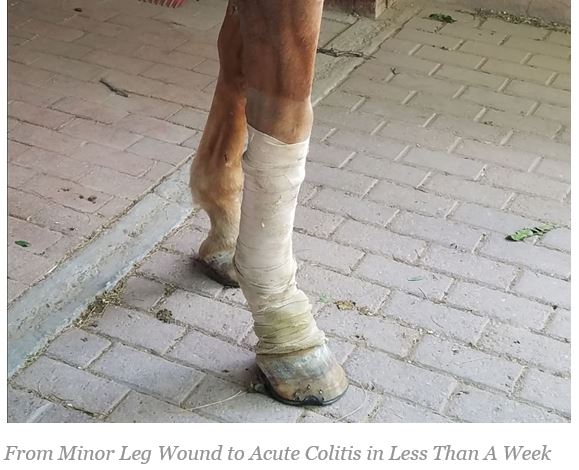 Flash had a small wound on his lower leg that had taken forever to heal. His vet recommended an antibiotic for a week, but the owner didn’t think the wound was healing fast enough. Her friend happened to have another antibiotic in her tack trunk. They added that one in too. 24 hours after starting the second antibiotic, Flash stopped eating, developed a fever, and then started pipe-stream diarrhea.
Flash had a small wound on his lower leg that had taken forever to heal. His vet recommended an antibiotic for a week, but the owner didn’t think the wound was healing fast enough. Her friend happened to have another antibiotic in her tack trunk. They added that one in too. 24 hours after starting the second antibiotic, Flash stopped eating, developed a fever, and then started pipe-stream diarrhea.
After 3 weeks in an equine hospital isolation barn and over $14,000.00 in vet bills, Flash was finally able to go home. He was crippled by laminitis, and he had lost one of his jugular veins. It would take him 3 months to return to being ridden again and he was never quite the same. Flash was one of the lucky ones. Most horses that develop severe antibiotic-induced colitis do not survive. READ MORE
Don’t take antibiotic use in the horse lightly! As a responsible horse person:
• You should understand the potential benefits but also the limitations and dangers of systemic antibiotic use in horses.
• You should always use antibiotics under the direction of a licensed vet, experienced in equine medicine.
• You should recognize how fragile the equine intestinal microbiome is compared to that of other species. Know that disturbing it through the use of antibiotics can in rare cases mean the death of the horse.
• You should also understand and respect the danger of development of bacterial resistance to antibiotics.
• You should know the few antibiotics labeled for use in the horse, and that other use of antibiotics is extra-label. If there is an FDA-approved antibiotic for a given use, your vet should ideally select that over an extra-label antibiotic.
• You should have the skills to properly administer the medication. Here are a few skills that I list in Horse Side Vet
Guide, which you might need to be able to treat your horse with antibiotics:
Assessing treatment effectiveness: https://horsesidevetguide.com/drv/Skill/194/assess-effectiveness-of-treatment-objectively/
As the horse’s owner, you also have a vital role in providing feedback as to how a treatment is working. In this way, adjustments can be made in treatment plan.
How to give oral Medication:https://horsesidevetguide.com/drv/Skill/28/give-oral-medication/
Assess your horse’s general health:https://horsesidevetguide.com/drv/Skill/146/perform-whole-horse-exam-whe/
